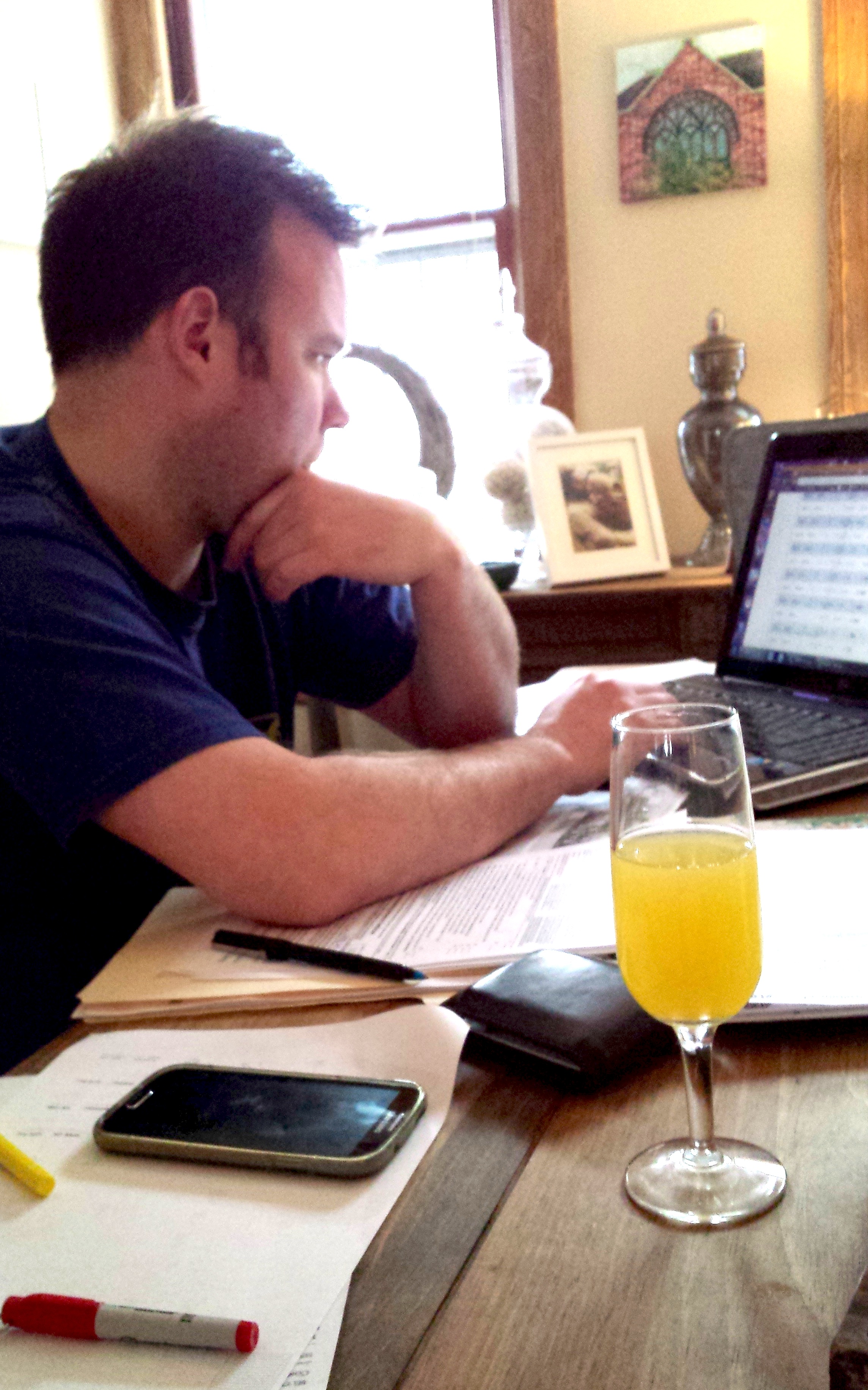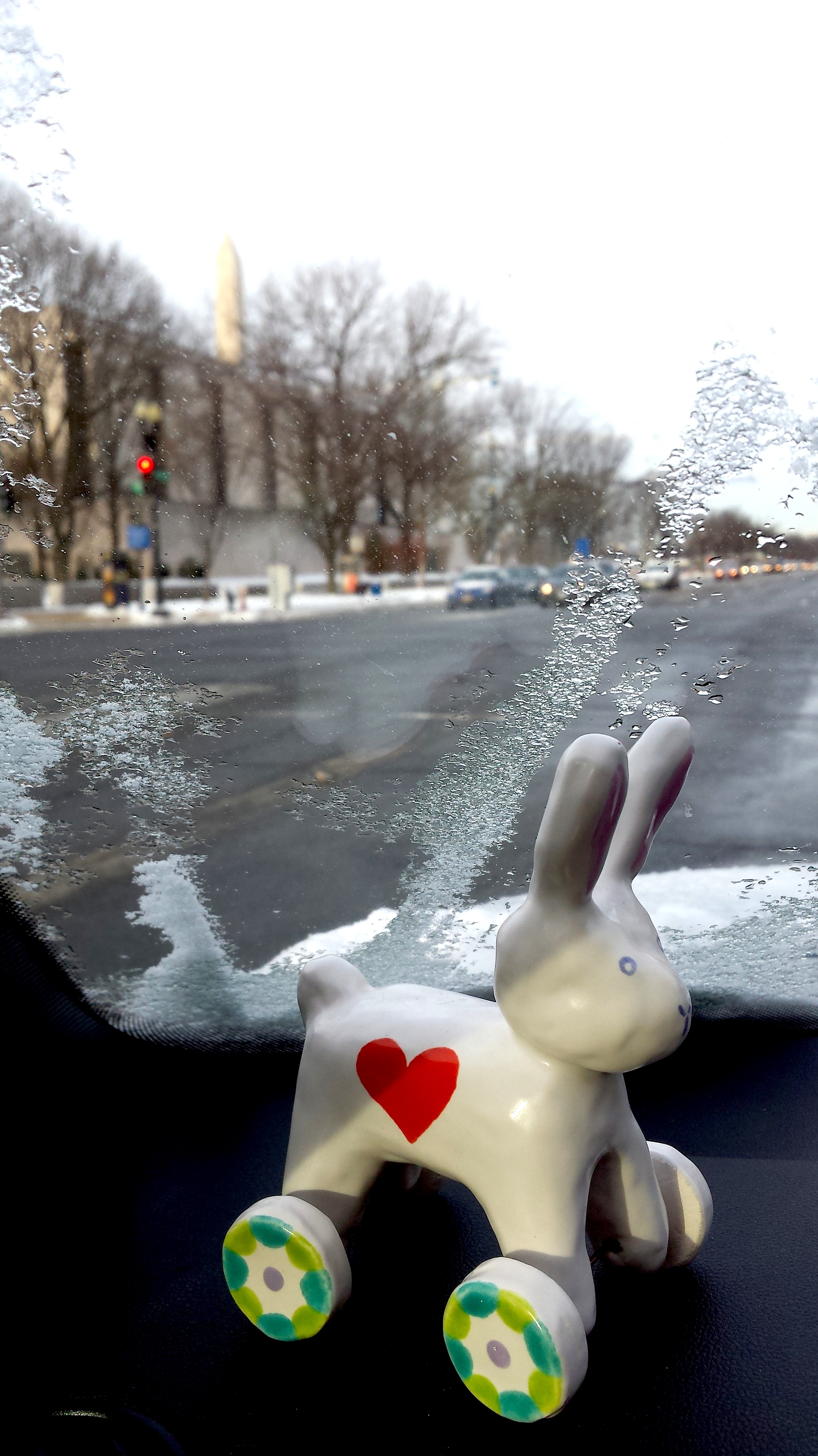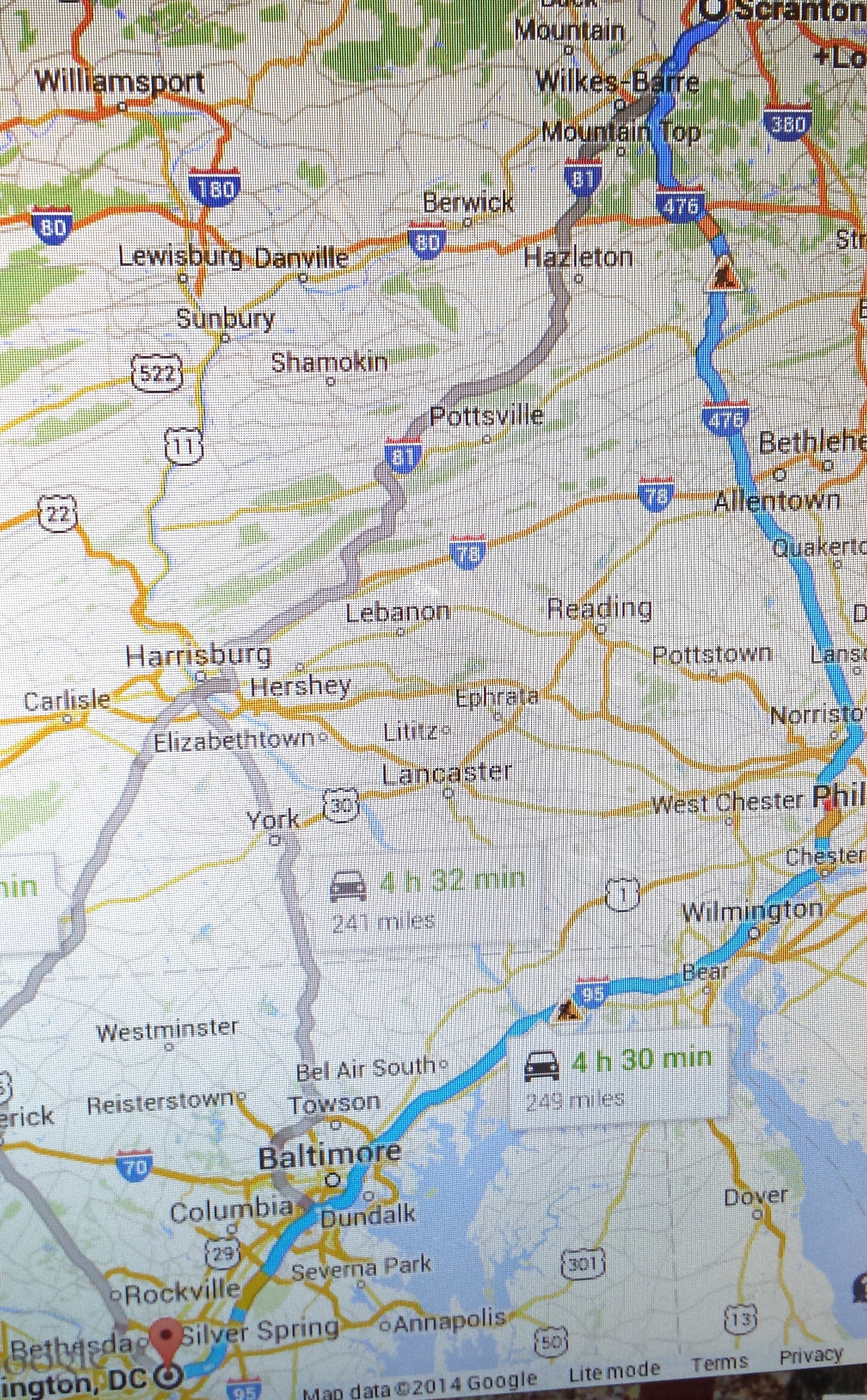Storms
On Saturday the weather forecast did not look good. South of us, storm Titan had caused three thousand flights to be canceled and another ten thousand delayed. Tens of thousands of homes were without power. Motorists were stranded in Missouri and the governor of Mississippi issued a state of emergency. Ultimately a dozen people would be killed in the storm and hundreds of accidents would occur on icy roads before Titan moved out to sea.
Storm number one.
Harry and I had agreed to take the western route to Washington, D.C., thinking we might skirt around the storm. At nightfall on Saturday we had reached Binghamton, New York. The sky was steely and the wind was bitter, so instead of forging into the dark, we checked into a hotel for the night.
The heat had not been turned on in our room, and it was freezing. Harry flipped on the heater switch and took a hot shower while the room warmed up. I put on fleece PJs and we snuggled together under the covers and watched an old concert on PBS—Eddie Vedder with long hair, George Harrison, and a young looking Stevie Wonder. While we reminisced about those good old times, I thought about how the Bug trip was taking us back to an era before children and a house mortgage when we were free to pick up and go. I had forgotten the thrill of taking off without a second thought. Now in our sixties and retired, we had come back around to those freer days.
By Sunday morning it looked like most of Titan’s wrath was still west of the mid-Atlantic coast and with luck we could make it to D.C. before the worst of it. My son Bryant lived on Capitol Hill with his girlfriend Britt, and we could hole up in their guest room while the storm raged.
Harry had recently had been in touch with a college chum named Dan who lives in Philadelphia, and he wanted to stop to see him on the way.
“I’ve never heard you talk about anybody named Dan,” I said.
“He was one of my best friends.”
“But you haven’t gotten as much as a Christmas card from him.”
“We just reconnected,” he said.
“Well, if you insist on going through Philly, we can get on the toll road at Scranton.”
It cost seventeen dollars in tolls to reach Philadelphia. Harry called Dan from the highway but there was no answer.
“Nevermind,” he said. “Let’s just keep going.”
“Did you leave Dan a message?” I asked.
He shook his head no.
I wondered if he really wanted to see his old pal Dan. I could understand his ambivalence. My own college days were rife with angst. There were student protests against the Vietnam War, and campuses all over the country closed down early. We were all full of outrage, frustration and a desperate struggle to find ourselves. Harry was at Harvard where everyone was outstanding in one way or another. He escaped a sense of inadequacy as well as the political turmoil at the ice hockey rink where he played on Harvard’s varsity team.
“Harvard’s indoor track was named after Dan’s father, a New York banker,” Harry said. “Dan was a squash athlete. We were both members the Owl Club.” Harry had taken me to the Owl Club once, a mahogany paneled house with leather club chairs and a pool table. When he was there in the early ‘70s, the college had hired an amiable older fellow to make sandwiches for the young men and insure that the elite students had everything they desired. When the rest of the country was tuning in, turning on and dropping out, Harry and Dan had found sanctuary in old traditions.
Because of our detour to see the phantom friend, the Bug got tangled in downtown Philadelphia traffic. Harry blamed me. I had the map and should have found a better route out of the city. I resented being blamed. We didn’t speak until we reached the boundary of Washington.
“Drop me at the train station,” I said. “You can do your cross-country trip alone.”
Storm number two.
Harry apologized. He didn’t want to drive eight thousand miles alone. I couldn’t blame him.
By the time we arrived at Bry’s house, freezing rain had started. I carried in the case of Heady Topper for Bry. The night before, Harry and I had schlepped the beer into the hotel room to keep it from freezing and then back into the Bug the next morning. I was happy to be rid of the stuff.
Britt laid out a board of cheese and meats and put a glass of wine in my hand. Before I finished the glass, Bry and Britt received messages that there would be no work the next day. The entire Federal government was shut down. It looked like the Bug wouldn’t be going anywhere either.
Bry called an Uber cab to take us to his favorite restaurant on H Street, and we were dropped in front of a stone building wedged next to a barbershop. A small sign in the window said Granville Moore’s.
“Used to be a doctor’s office,” Bry said. The interior was dimly lit and packed with young people. We walked past the bar and through a brick passageway to the stairs. Upstairs a waiter showed us to a booth and gave us menus. Bry ordered mussels. Britt asked for seasoned fries with three dips, I got the gnocci, and we each had a local brew. Harry wasn’t feeling hungry but Bry encouraged him to try the creamy bacon mac and cheese. We shared everything, and everything was delicious.
Bry kept us entertained with witty banter. Afterward, he showed us some of the highlights of the H Street Corridor, including a bar with a miniature golf course upstairs. Each hazard had a DC theme—Lincoln Memorial, Washington Monument, and a grossly overweight meter reader writing a ticket for an expired meter. Down the street we made a stop at a pie bakery and got slices of chocolate pecan and caramel custard to go.
When the freezing rain turned to sleet, Bry called for a cab and we took a slippery ride back to 16th Street. In his baseman man cave, we settled on the sofa with Britt’s Yorkshire and Scottish terriers to watch the Oscars while we nibbled the pie and watched Ellen Degeneres crack lame jokes between awards.
Harry fell asleep well before best actor was announced. He had been nearly silent during dinner, and I suspected he wasn’t feeling well. Britt crashed on Bry’s shoulder, leaving Bry and me to trade quips about the award performances until the bitter end at midnight.
After Harry and I stumbled up to bed, I listened to Bry play his guitar downstairs until after 1:00 a.m. When he was in high school, he played into the wee hours until I told him to put the guitar away because it was a school night. But this was his house, and no one had to go anywhere the next day.
The last time I looked out the window that night, snow had begun to fall.
In the morning the snow came down in earnest. Museums and art galleries were closed. Government offices in Maryland and Virginia and all area schools—shut down. Then Harry shut down. After a gut wrenching vomit, he took to bed.
Storm number three.
 Britt used her juicer to make a healthy elixir of veggies and fruits, and I took a glass up to Harry. He shook his head. His face was flushed and he seemed to be running a fever. I imagined doctors’ offices were closed and hoped he didn’t have anything serious.
Britt used her juicer to make a healthy elixir of veggies and fruits, and I took a glass up to Harry. He shook his head. His face was flushed and he seemed to be running a fever. I imagined doctors’ offices were closed and hoped he didn’t have anything serious.
Bry worked on his taxes, Britt did some computer networking for the design company she works for, and I caught up on email, all three of us claiming spaces around the long dining table. Bry put some jazz on and we listened to sleet tapping its icy fingers on the windows.
Later, I bundled into my down coat, glad Harry pressed me to bring it, and went out to scrape ice and snow off the frozen Bug. Bry walked to the corner store and came back with ginger ale and a can of chicken noodle soup for Harry, and a bottle of champagne for the rest of us. Harry accepted the ginger ale but refused the soup. When I felt his forehead, he seemed to be burning with fever. I dug through the medicine cabinet and found Advil to make him more comfortable.
That evening the three of us drank champagne and scraped together a dinner from the refrigerator. The snow finally stopped, but it was bitterly cold and windy. We were all in bed by 10:00 p.m., both pups curled up with my feverish husband and me.
The next morning Harry was able to get out of bed and dress.
“Do you feel well enough to travel?” I asked. He nodded.
I offered to drive, and we said quick goodbyes to Britt and Bry, who were getting ready to go back to work. I didn’t mention Dan or whether our fight was responsible for his illness. Our pattern after an argument is to roll back time to before the disagreement. After more than two decades of marriage, we’ve learned that rehashing the ugliness serves no purpose.
As we headed southwest toward the Shenandoah Valley, the sky cleared and the sun came out. Thankfully, all three storms had passed and we were again on our way.
